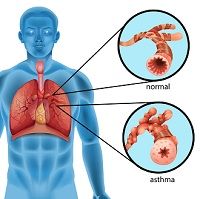Article
Wrangling Rogue “ADAM33†Gene Could be Key to Preventing Asthma
Author(s):
A recently released study from the University of Southampton argues that if a gene that causes airway remodeling can be turned off, remodeling can be reversed and asthma can be prevented.

ADAM33 is a gene that researchers say is responsible for creating an enzyme that may cause airway remodeling and allergen sensitivity integral to the early development of asthma. When that enzyme detaches from cell surfaces in airway muscles, it can “go rogue,” causing the breathing difficulties associated with the widespread condition.
So their potential solution to asthma? Turn ADAM33 off, or stop it from going rogue.
This all sounds radical, and in a sense it is. Professor Hans Michel Haitchi, the leader of the study, considers it a total realignment of our understanding about asthma’s origins. "For years we have thought that airway remodeling is the result of the inflammation caused by an allergic reaction,” Haitchi says, “but our research tells us otherwise."
Their study demonstrated that the presence of ADAM33 caused the muscles around the lungs to remodel themselves with more blood cells, but inflammation did not begin until an allergen was introduced. Other elements of the study involved switching the gene on and off in mice, showing that mice with ADAM33 switched off displayed drastically less inflammation in response to the introduction of a common allergen.
Haitchi is extremely confident in this work, saying that is has “challenged the common paradigm” airway remodeling is a consequence of asthmatic inflammation, rather than, as the study seems to present, a process caused by rogue ADAM33 that creates the conditions for such inflammation to be stimulated by allergens. If it seems like an entirely novel understanding of asthma, it’s because it is.
The study was published in The Journal of Clinical Investigation Insight.


